India has diverse Soil Types and their Distribution is also non-uniform. In this article, we will analyze different soil types found in India, their characteristics, and their distribution across the country. The Indian Council of Agricultural Research (ICAR) identifies eight major soil types across the country, each supporting distinct crops and ecosystems.
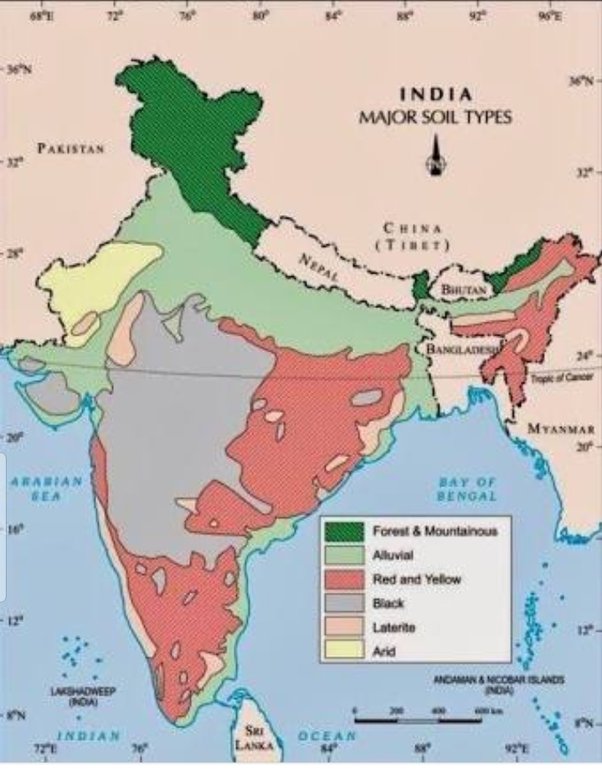
India has different soil types, like Alluvial, Black, Red, Laterite, Desert, and Mountain soils.
Table of Contents
Alluvial Soil
Alluvial soil is the most common soil type in India. It is found in the Indo-Gangetic plains, the Brahmaputra valley, and the coastal plains. This soil is formed by the deposition of silt and clay by rivers and is rich in nutrients. This soil is ideal for agriculture.
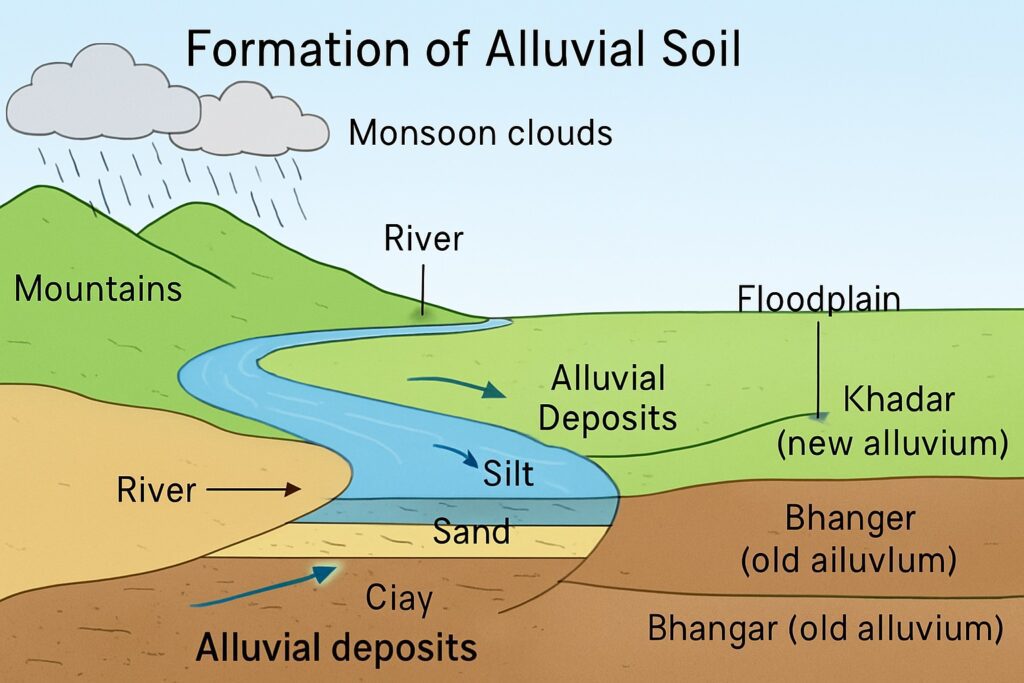
Formation
-
Formed by the deposition of materials brought by rivers from mountains and plateaus.
-
Regular floods during the monsoon season help replenish and enrich this soil.
Geographical Distribution in India
-
Northern Plains: Punjab, Haryana, Uttar Pradesh, Bihar, West Bengal.
-
River deltas: Mahanadi, Godavari, Krishna, and Cauvery deltas in the east coast.
-
Also found in some coastal regions and valley floors.
Characteristics
-
Texture: Ranges from sandy loam to clay.
-
Colour: Usually light grey to ash grey.
-
Rich in: Potash, phosphoric acid, lime.
-
Poor in: Nitrogen and organic matter.
-
Highly fertile and suitable for agriculture.
Crops Grown
-
Rice
-
Wheat
-
Sugarcane
-
Cotton
-
Pulses
-
Oilseeds
-
Jute (especially in deltaic alluvial soil)
Types of Alluvial Soil
-
Khadar:
-
Found in floodplains
-
More fertile
-
Light in colour
-
-
Bhangar:
-
Found in slightly elevated areas
-
Less fertile
-
Contains calcareous nodules called kankar
-
Black Soil
Black Soil is rich in clay and has a high moisture-retaining capacity. It is black and swells when wet and contracts when dry. It has a high moisture retention capacity. So, it is prone to cracks. Black soil is found in the Deccan Plateau region, like Maharashtra, Madhya Pradesh, Gujarat, and some parts of Tamil Nadu. These soils are suitable for cotton and tobacco cultivation. Black soil is known as regur soil. This soil is rich in iron, magnesium, and other nutrients.
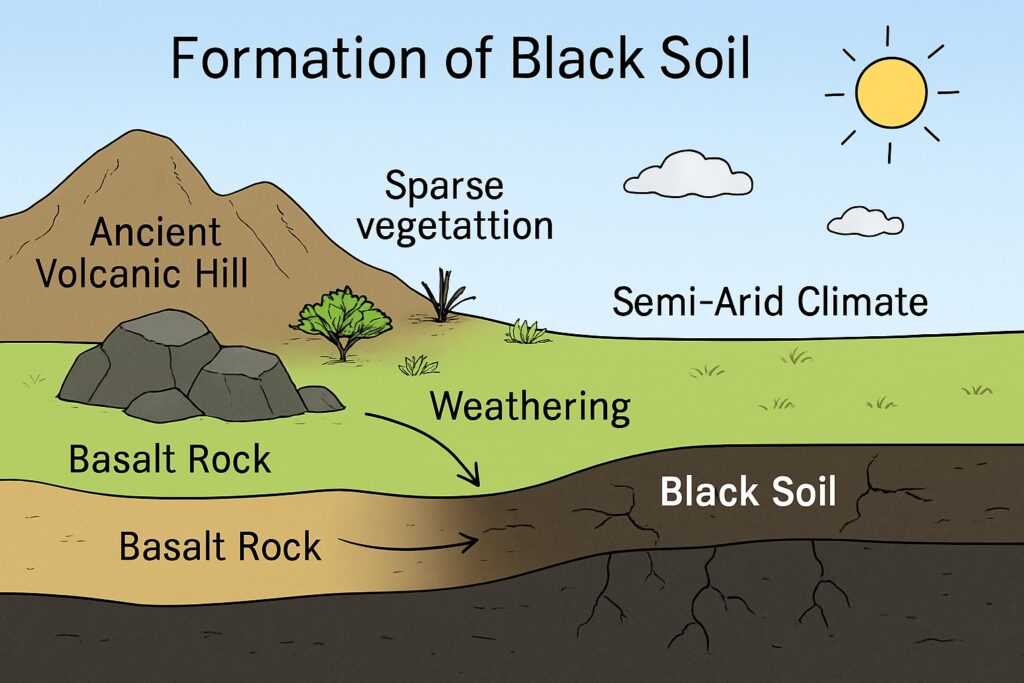
Origin and Formation
Black soil is formed by the weathering of volcanic rocks, mainly basalt, under semi-arid climatic conditions. These rocks are found extensively in the Deccan Plateau, which covers parts of Maharashtra, Madhya Pradesh, Gujarat, Karnataka, Andhra Pradesh, and Tamil Nadu.
Millions of years ago, this region witnessed lava flows from volcanic eruptions, which over time broke down into fine particles, giving rise to this unique type of soil.
Geographical Distribution
Black soil is mainly found in:
-
Maharashtra
-
Madhya Pradesh
-
Gujarat
-
Karnataka
-
Telangana and Andhra Pradesh
-
Tamil Nadu
These regions fall in the Deccan Trap area, where ancient lava flows covered vast expanses of land.
Characteristics of Black Soil
-
Color: Deep black to grey.
-
Texture: Fine-grained, clayey, and sticky when wet.
-
High moisture retention: It can hold water for long periods, making it ideal for crops in dry areas.
-
Fertility: Rich in minerals like iron, lime, calcium, potassium, and magnesium, but deficient in nitrogen, phosphoric acid, and humus.
-
Cracking nature: During dry seasons, it forms deep cracks which help in air circulation and soil aeration.
Crops Grown
Due to its moisture-holding capacity and fertility, black soil is ideal for:
-
Cotton (hence called cotton soil)
-
Jowar (sorghum)
-
Bajra (millet)
-
Pulses
-
Oilseeds (groundnut, sunflower, soybean)
-
Sugarcane
-
Wheat (in irrigated areas)
Climatic Suitability
-
Best suited for semi-arid and sub-humid climates
-
Requires moderate rainfall (50–100 cm)
-
Performs well in areas with distinct wet and dry seasons
Agricultural Challenges
-
Becomes sticky and difficult to plough when wet.
-
Hardens and cracks when dry.
-
Requires good irrigation management and organic fertilizers to make up for the nutrient deficiency (especially nitrogen and phosphorus).
Red Soil
Red soil is found in the southern and eastern parts of India, like Tamil Nadu, Andhra Pradesh, and Odisha. This soil is rich in iron and aluminum, and is low in fertility, making it less suitable for agriculture.
Red soil is one of the oldest and most widespread soil types in India. Named for its distinctive reddish color, this soil is known for its iron-rich content and is commonly found in regions of low rainfall and high temperatures. Though not as naturally fertile as alluvial or black soil, red soil can support a variety of crops with proper management and fertilization.
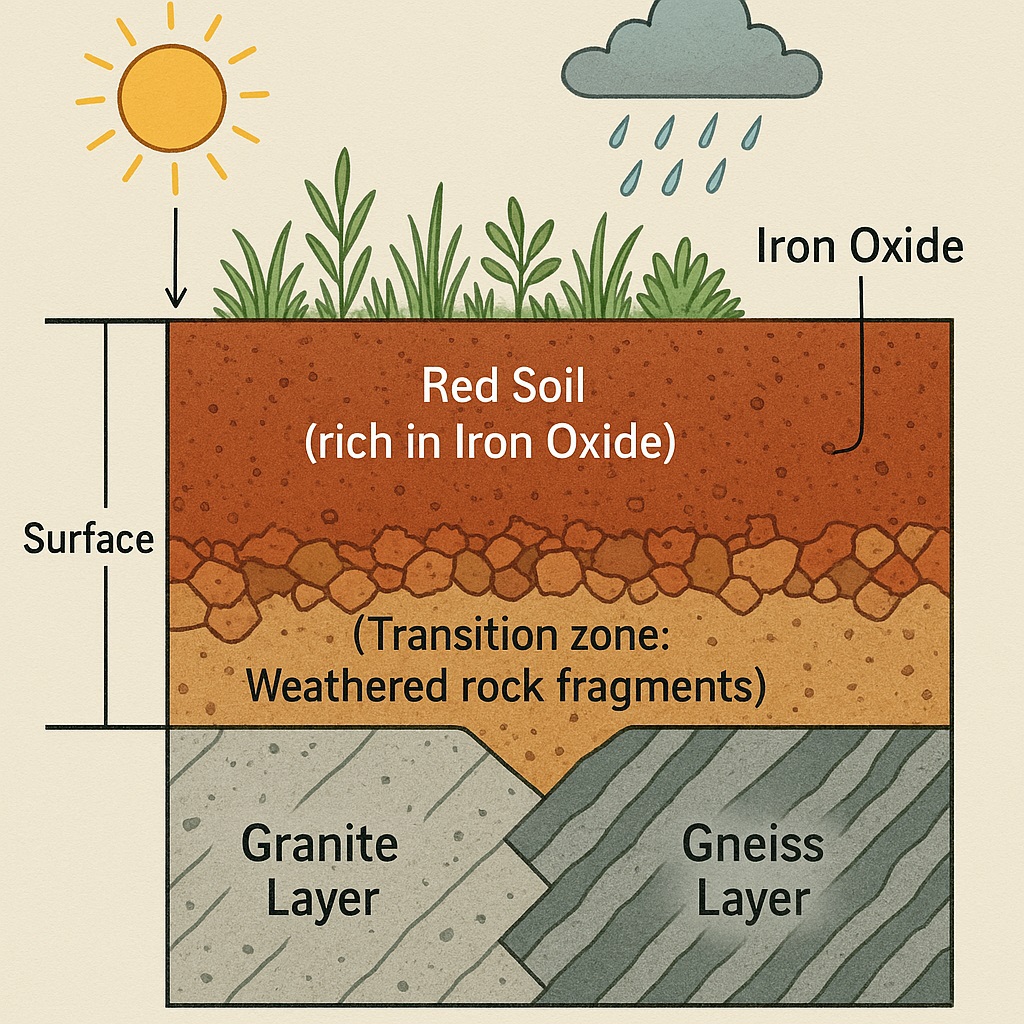
Origin and Formation
Red soil is formed by the weathering of ancient crystalline and metamorphic rocks, particularly granite and gneiss. The red color is due to the presence of iron oxide (ferric oxide). Over centuries, physical and chemical weathering under warm, moist conditions led to the development of this soil, especially in non-alluvial upland regions.
Geographical Distribution
Red soil is mainly found in:
-
Tamil Nadu
-
Karnataka
-
Andhra Pradesh
-
Telangana
-
Odisha
-
Chhattisgarh
-
Jharkhand
-
Parts of Maharashtra and Madhya Pradesh
-
South-eastern Rajasthan
It also covers the eastern and southern parts of the peninsular plateau.
Characteristics of Red Soil
-
Color: Reddish due to iron; can appear yellowish in places where iron is in a hydrated form.
-
Texture: Sandy to loamy; porous and friable.
-
Acidity: Generally slightly acidic in nature.
-
Drainage: Well-drained and aerated.
-
Nutrient content:
-
Rich in: Potassium and iron.
-
Poor in: Nitrogen, phosphorus, lime, and humus.
-
-
Fertility: Generally low but can be improved with fertilization and irrigation.
Crops Grown
With proper irrigation and fertilization, red soil supports the cultivation of:
-
Millets (ragi, bajra)
-
Pulses
-
Groundnut
-
Cotton
-
Wheat
-
Oilseeds (sunflower, safflower)
-
Potato
-
Fruits and vegetables
Climatic Suitability
-
Found in regions with moderate to low rainfall (50–100 cm)
-
Performs best in semi-arid to sub-humid climates
-
Requires irrigation and manuring for high productivity
Agricultural Challenges
-
Low natural fertility
-
Susceptible to soil erosion if not managed well (especially on slopes)
-
Needs regular application of fertilizers and organic matter
Laterite Soil
Laterite soil is found in the hilly areas of western and eastern ghats, like Kerala, Karnataka, and Maharashtra. This soil is red in color, has high iron content, and has poor fertility. This makes it unsuitable for agriculture. Laterite soil is a type of soil rich in iron and aluminum, formed in hot and wet tropical regions. The name “laterite” comes from the Latin word later, meaning brick, due to its use in making building bricks when hardened.
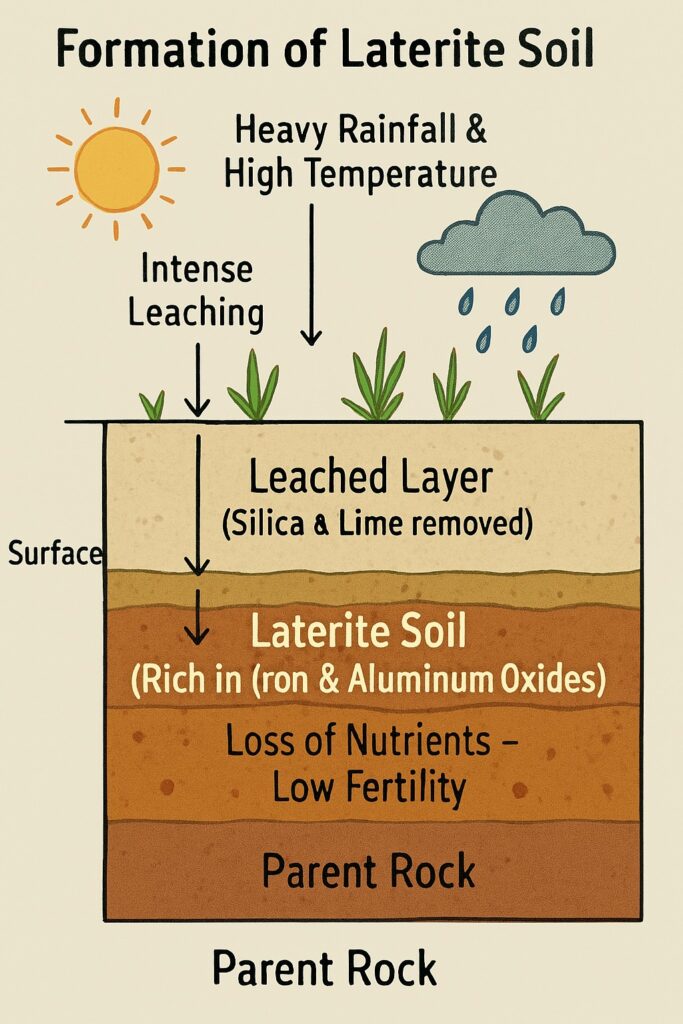
Formation of Laterite Soil
Laterite soil is formed through a process called laterization, which occurs under the following conditions:
-
Heavy rainfall and high temperatures cause intense leaching (washing away) of silica and lime from the soil.
-
What remains behind are oxides of iron and aluminum, giving the soil a reddish or yellowish color.
-
The process removes most nutrients, making the soil poor in fertility.
Key Characteristics
-
Formed in areas with high rainfall and high temperatures
-
Develops through intense leaching caused by heavy rains
-
Rich in iron and aluminum oxides
-
Poor in essential nutrients like nitrogen, potassium, and lime
-
Reddish or yellowish in color due to iron content
-
Originates from the weathering of rocks under tropical conditions
-
Becomes hard and compact when exposed to air (used in making bricks)
-
Not very fertile naturally, but fertility can be improved with manures and fertilizers
-
Common in Western Ghats, Eastern Ghats, plateau regions of Odisha, Maharashtra, Kerala, and Assam
Distribution in India
Laterite soil is mainly found in:
-
Western Ghats (Kerala, Karnataka)
-
Eastern Ghats (Odisha, Andhra Pradesh)
-
Central India (Madhya Pradesh, Chhattisgarh)
-
Northeastern states and parts of Tamil Nadu and West Bengal
Use of Laterite Soil
-
With irrigation and fertilizers: Suitable for tea, coffee, cashew, rubber, and some pulses.
-
In its natural form: Used for grazing or forestry.
-
Building material: When cut into blocks and dried, laterite becomes hard and durable, widely used for construction of walls and houses in rural areas.
Desert Soil
Desert soil is found in the Thar desert region of India. It has a sandy texture and low fertility. This soil is used for grazing livestock and is unsuitable for agriculture. Desert Soil is typically found in arid and semi-arid regions, particularly in areas with low rainfall and high temperatures. It is commonly found in regions such as the Thar Desert in Rajasthan and parts of Gujarat, Haryana, and Punjab.
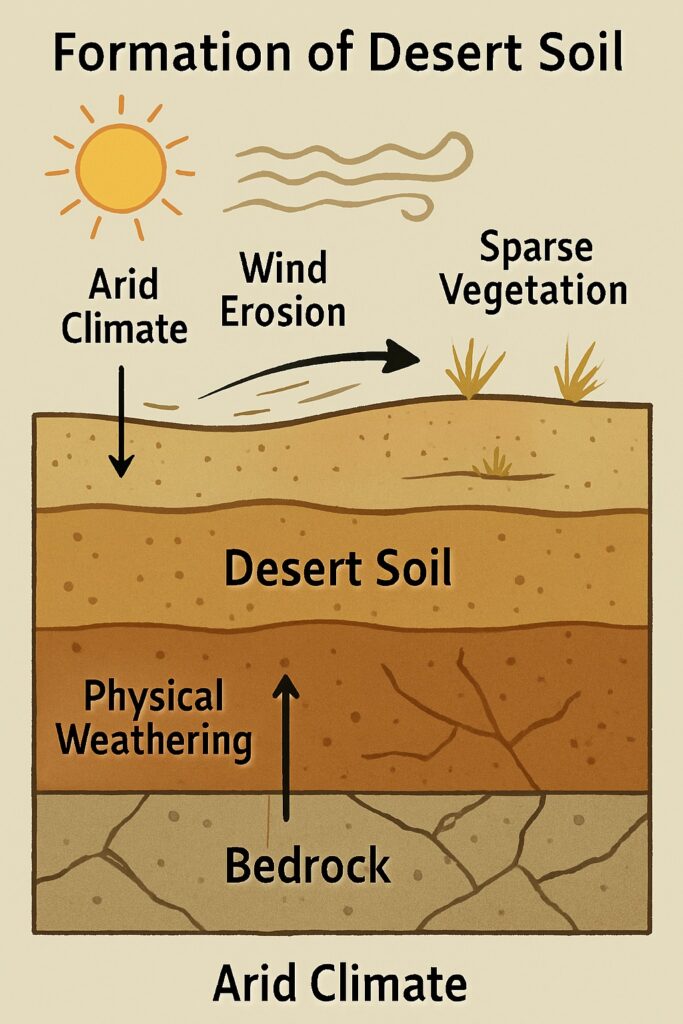
Formation
Desert soil is formed due to the weathering of rocks under arid conditions. The lack of moisture and vegetation cover slows down the soil formation process. Wind erosion plays a major role in shaping this type of soil.
Characteristics
- It is sandy to gravelly in texture and has a loose structure.
- The color of desert soil ranges from light brown to reddish-brown.
- It has low moisture content and poor water retention capacity.
- Organic matter and humus content are very low, making it less fertile.
- It is rich in soluble salts, especially in lower layers.
- Often, a calcareous layer or hardpan of lime accumulates in the subsoil due to evaporation.
Fertility and Use
Although desert soil is not naturally fertile, with proper irrigation and use of fertilizers, it can be made suitable for crops like millets, barley, maize, and pulses. In areas with irrigation support such as the Indira Gandhi Canal, it has been used effectively for cultivation.
Let me know if you need a comparison with other types of Indian soils.
Mountain Soil
Mountain soil is found in the Himalayan region of India. It has a rocky texture and low fertility. This soil is used for horticulture and plantation crops. These soils are formed through the mechanical weathering of rocks caused by snow, rain, and temperature variations. Their characteristics vary with altitude, slope, and vegetation.
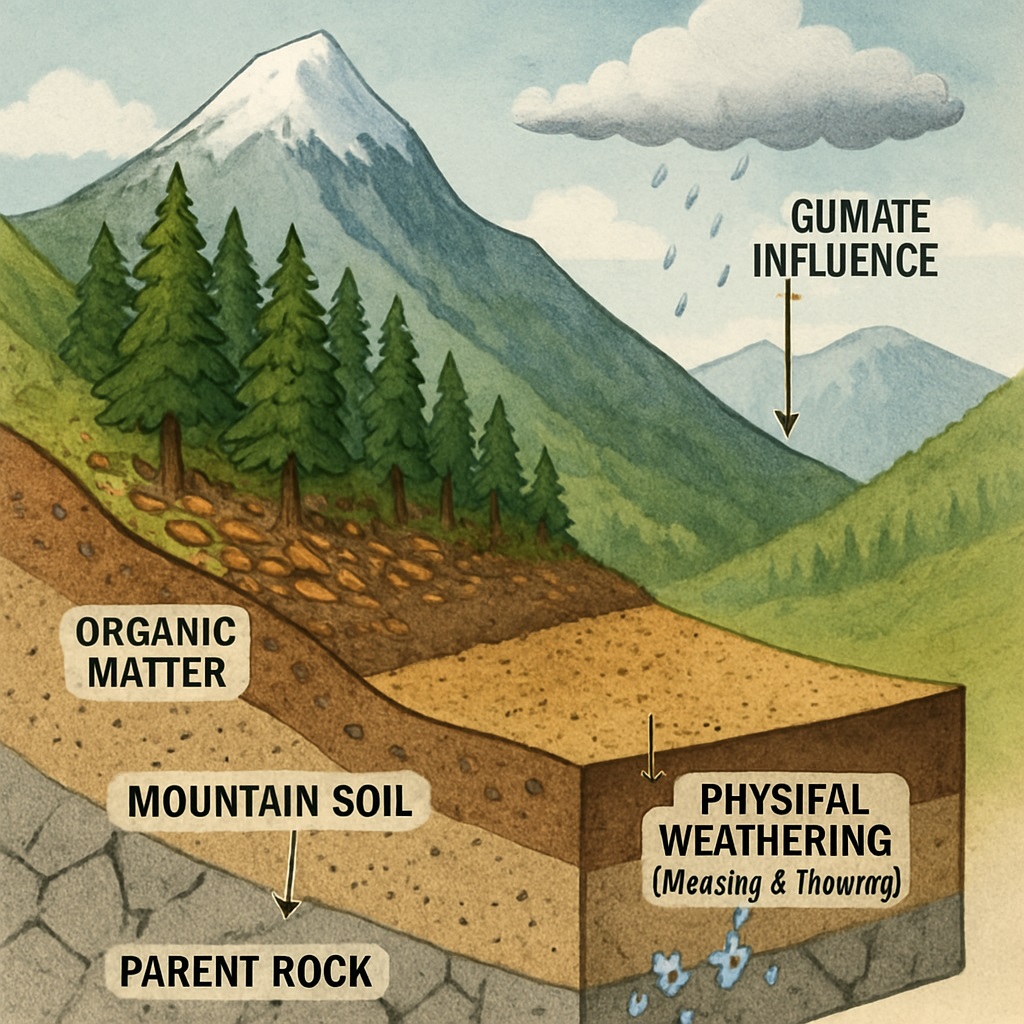
Formation:
Mountain soils are formed by the deposition of organic matter from forest vegetation and the disintegration of rocks under physical weathering processes like freezing and thawing. The type of soil found depends largely on the climatic conditions and the nature of the parent rock.
Characteristics:
-
Found on slopes of hills and mountains, especially in the Himalayan region and the Western and Eastern Ghats.
-
Generally shallow and coarse in texture due to erosion and steep slopes.
-
Rich in organic matter, especially in regions with dense forest cover.
-
Fertility varies with altitude: soils at lower altitudes may be fertile and suitable for agriculture, while higher altitude soils are less fertile and more acidic.
-
Prone to erosion if deforestation occurs or slopes are not managed properly.
Crops Grown:
In suitable areas, mountain soils support the cultivation of tea, coffee, spices, fruits like apples, and maize. In some areas, terrace farming is practiced to make the slopes suitable for agriculture.
Distribution:
These soils are commonly found in:
-
Himalayan regions (Jammu & Kashmir, Himachal Pradesh, Uttarakhand, Sikkim, Arunachal Pradesh)
-
Nilgiri Hills and other highland regions of the south
Read: Geography Notes